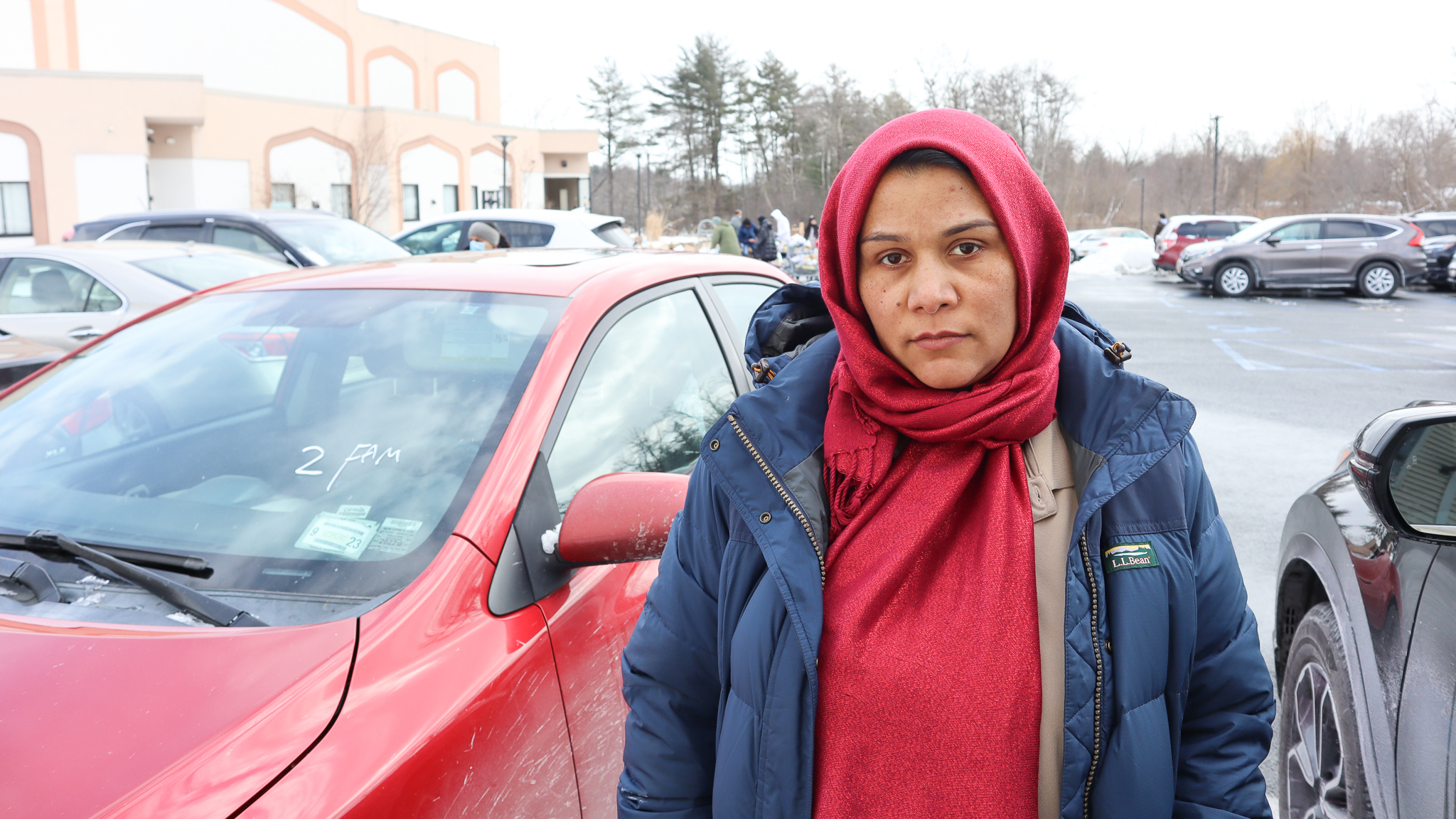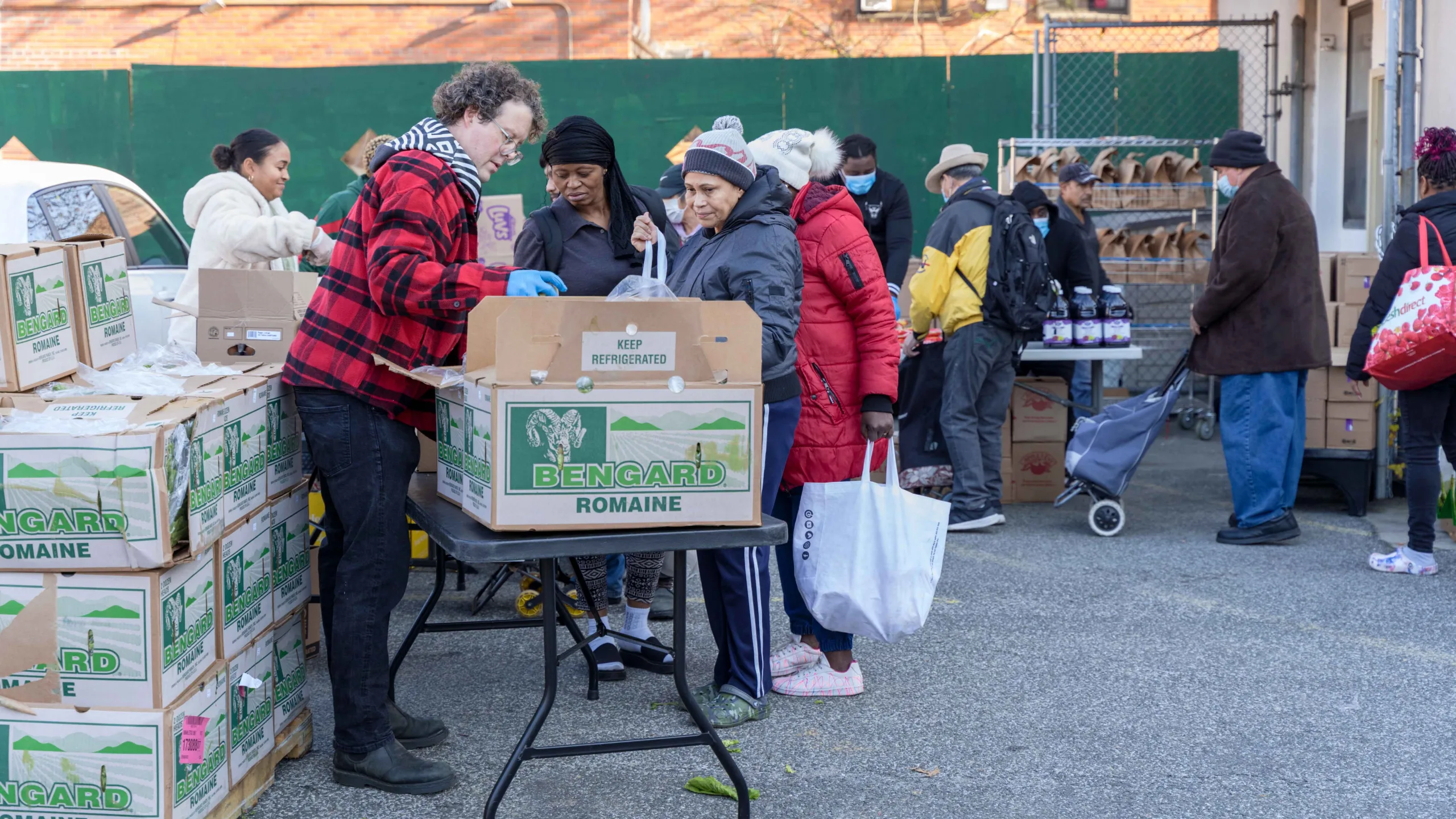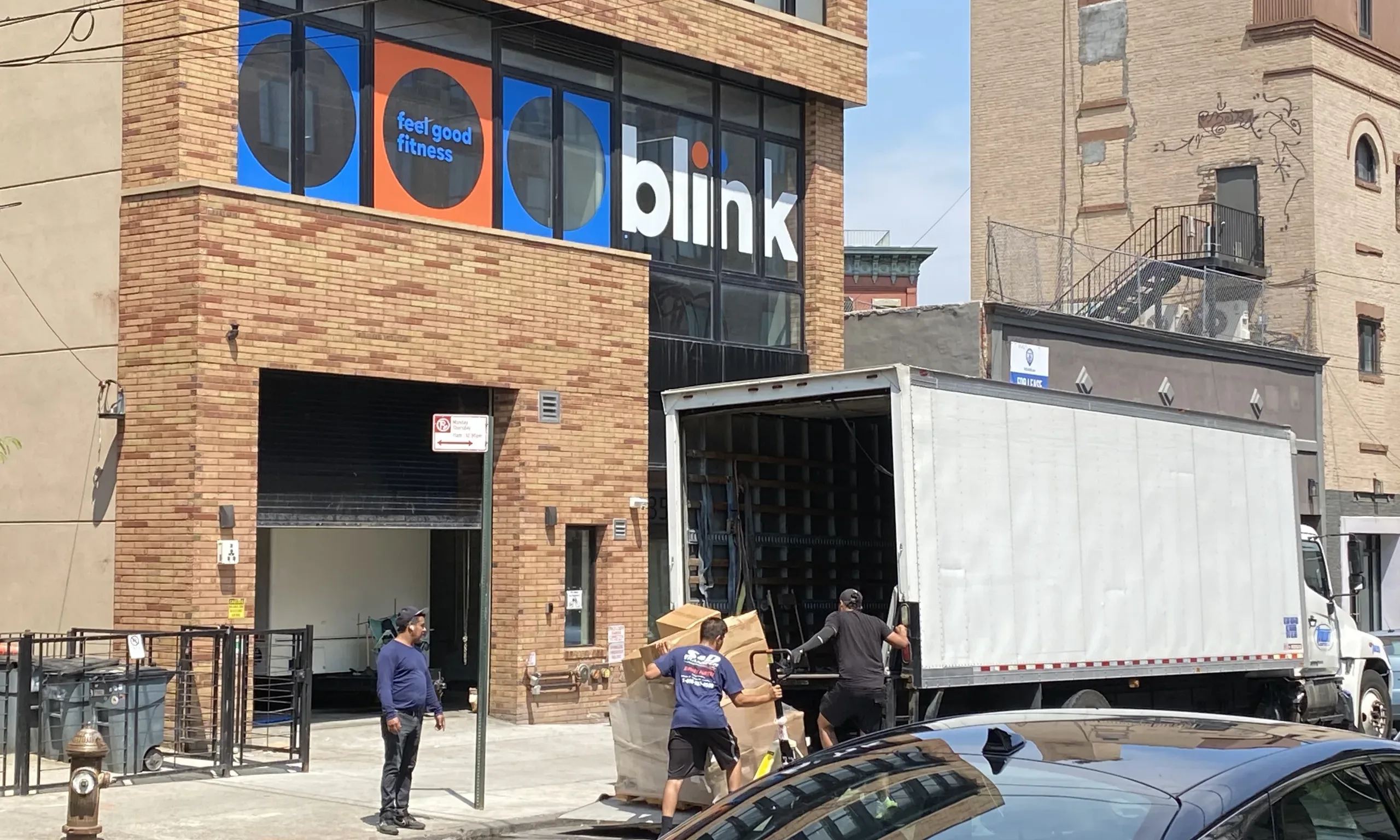Each morning, the family of nine fights for time to get ready in a single shared bathroom in an apartment, situated in the working class Delaware Avenue neighborhood of Albany. The children then wait in the cold for the city bus to take them to school, where they struggle to grasp what their teachers say in English, a language they don’t understand. And every night, the five girls huddle together, getting ready to sleep in one bedroom, where two sets of small bunk beds are packed tightly together.
“It’s a new country to become familiar with. You have to learn how to ask things and how to get help,” said Fariba Khwajazada, mother of eight children – seven who live with her in Albany – as she sat in her living room on a Sunday afternoon. “This is really tough in the beginning.”
About 1,800 Afghans who fled the country ended up in New York state, including the Khwajazada family, according to Governor Kathy Hochul’s office. They are among more than 76,000 Afghan evacuees who managed to make it to the United States when Kabul fell to the Taliban last year. For most, the exit was traumatic, and the adjustment to life in the United States adds layers of complication for those who resettled.
Recently arrived Afghan evacuees are facing a plethora of challenges: a new language, a different education system, difficulties finding employment, housing, and transportation, and delays in obtaining health insurance, among other issues.
The Khwajazada family has been living in Albany for about three months. Though they are grateful for the sense of safety they now feel, the family said in a recent interview at their home, the transition to their new lives has come paired with these exact roadblocks.
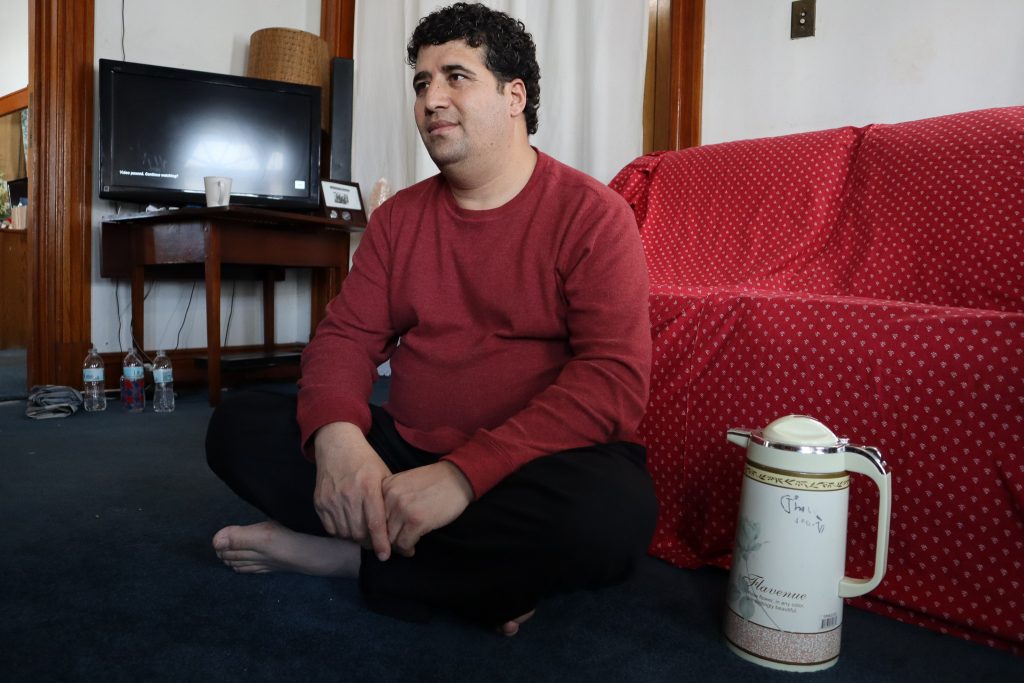
And the parents of the Khwajazada family still have one son who was unable to make it to the United States and is stuck in Turkey. They dream that one day, he will be able to join them.
In September, New York Governor Hochul said that around 100 Afghan evacuees would be resettled in Albany. And in December, her office announced that the number had jumped up to about 250.
But now, more than 350 Afghan evacuees have resettled near Albany since the fall of Kabul, according to the only resettlement agency in the area, the U.S. Committee for Refugees and Immigrants (USCRI), and local volunteers and community groups have been scrambling to provide aid to Afghans seeking out resources to build their lives.
Jill Peckenpaugh, the director of the agency’s field office in Albany, said that although the system has been strained, USCRI had expected a considerable number of Afghans to resettle in the region due to the existing family and community ties.
Also Read: How Ithaca Became a Haven for Refugees
“We already have such a robust Afghan community, and six mosques in the area,” Peckenpaugh said. “Easily 90 percent of the families who came already had families or friends here.”
At Refugee & Immigrant Support Services of Emmaus, Inc., a group that assists individuals arriving from other countries to the Capital Region, the demand for English language classes, immigration assistance, and support around food security has increased significantly since Afghan arrivals began to resettle in the area, said Daniel Butterworth, the executive director.
“We’ve been seeing new arrivals much quicker than we have in the past,” Butterworth said. “We’re actively trying to build out capacity so we can accommodate more folks.”
In the Khwajazada family, Fariba, the mother, is attending English language classes, and the other adults in the family are looking for resources to acquire new language skills. They have applied for federal assistance, including food stamps, with help from USCRI, though some members of the family have yet to receive their benefits, they said.
A long journey to Albany
The family of nine evacuated their home in Kabul and fled to the United States as the Taliban seized control of their city in August of 2021. For days, they slept on the street outside of the Kabul airport, they said, determined to board a plane out of the country. They then flew to Qatar, arriving in the United States in September of 2021.
For more than three months, the family stayed at the Fort Bliss military base’s Doña Ana complex in New Mexico, they said, where they had to hold the poles of their tents down as winds threatened to blow their makeshift homes away. Then they arrived in Albany in December of 2021, though they had requested to go to California.
For about two weeks, the family stayed in a hotel — the two parents in one room, and their seven kids squeezed into the other, with just two beds for seven of them — until USCRI found them housing on Delaware Avenue.
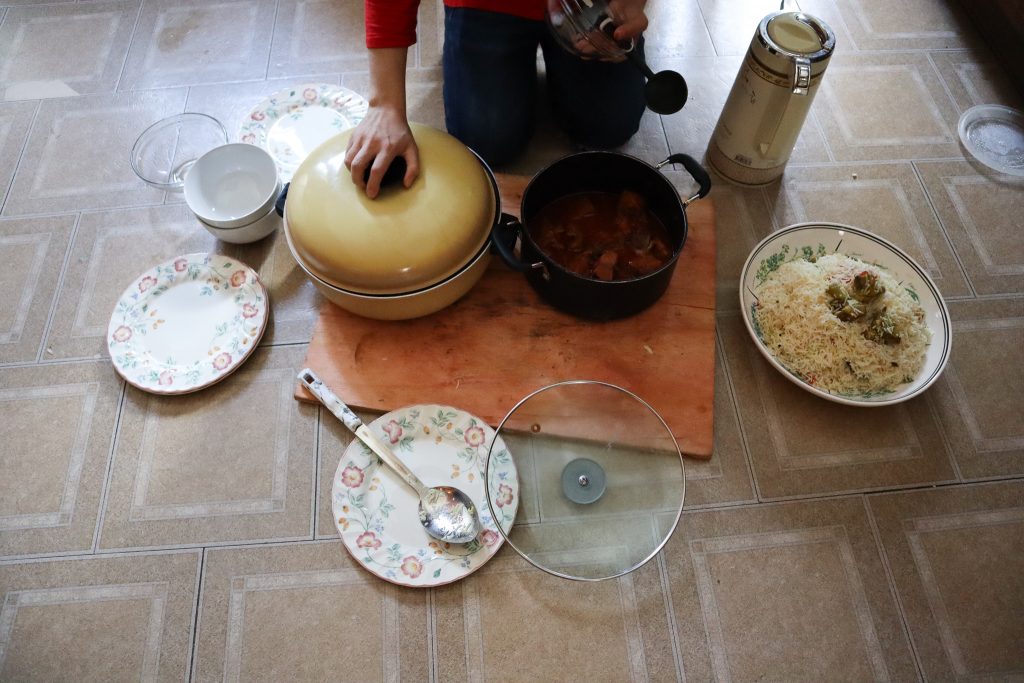
On a recent Sunday, the girls, ages 3 to 19, and their mother, gathered in the kitchen to cook traditional Afghan dishes, including Korma, a beef stew, and Achar, pickled vegetables. They laid the meal on a plaid tablecloth on the floor of the living room, and together, they gathered to eat, chatting in Dari about the new city they were living in and the life they had escaped.
The youngest girl, just three years old, melted into her father’s arms easily as he comforted her after a cry. The girls’ chatter filled the kitchen as they prepared food shoulder by shoulder. One of the daughters gently handed her mother, Fariba, medicine that Fariba was prescribed after going through a miscarriage.
Fariba, 35, had been two months pregnant when she began experiencing severe pain in recent weeks. But she waited to seek medical help for several days, since she was fearful of having to pay for medical bills because her health insurance had not yet come through, she said.
Now, after doctor and hospital visits, she has lost the baby and is still recovering from the effects of the miscarriage. At her home, she pulled her pants up by her ankle, to show how her legs had inflated, with swelling reaching down to her ankles.
“I was suffering for a few days,” Fariba said through an interpreter. “I was emotionally very worried — like what’s going to happen?”
Volunteers work to fill community needs
Yousaf Sherzad, a volunteer who has been spending his days assisting recently-arrived Afghan families, sometimes from morning until midnight, sat beside the Khwajazada family, recounting how he had requested an ambulance for Fariba when her distress became too worrisome.
Also Read: Health Care Access for Immigrants in New York
Sherzad, who lives in Albany but is from Afghanistan and arrived in the United States in early 2015, was a part of the army and police in Afghanistan. But lately, he has been working to fill the gaps he says are hindering families from obtaining the resources they need, and has been offering translation services for new arrivals, driving them to appointments, and organizing donation drives, among other tasks.
“If they go into a store, or a bank or somewhere, they don’t have that many volunteers that can translate,” Sherzad, 35, said. He tells people: “I will do translation for free, whenever you need help.”
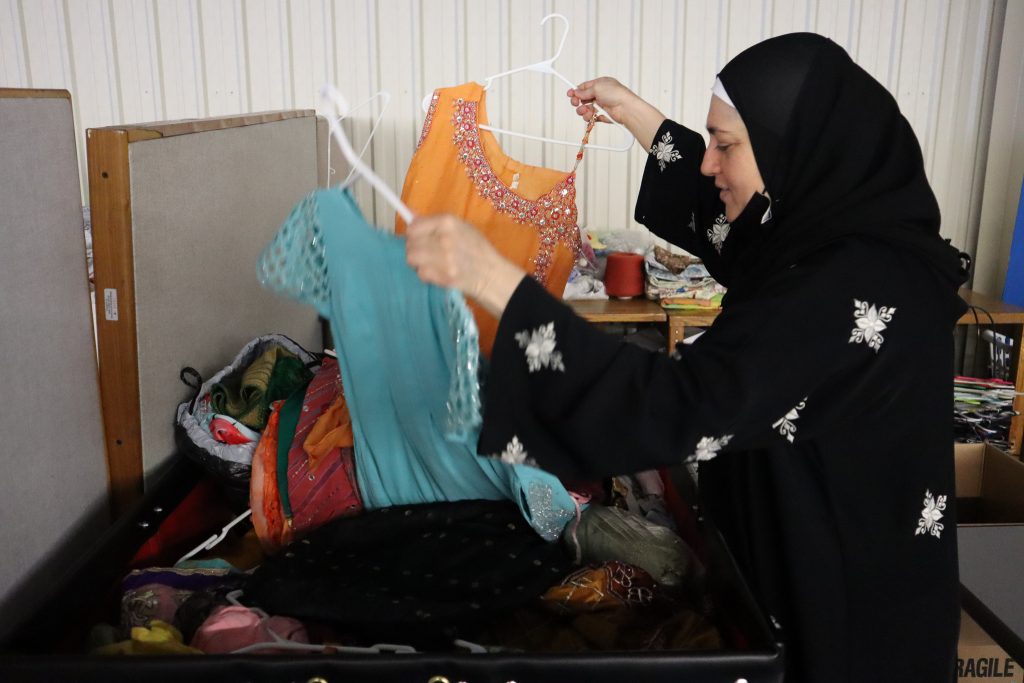
In Latham, a large donation center owned by a local mosque has been put to use as Afghan evacuees pick up everything from clothing, to furniture and diapers. Early on a Saturday morning, as a snowstorm swept through the region, Uzma Popal, another local volunteer, came to check in on the center.
She peeked through coat racks and children’s clothes, and pointed out welcome packages equipped with green tea and other gifts. As the director of the Muslim Soup Kitchen Project, she has organized a variety of projects, including meal delivery, and donation collections. The local mosques have formed a committee for Afghan evacuees to assist the new arrivals, Popal said.
“All non-profit organizations are trying to help, but we’re all limited in funds,” Popal said. “One person cannot do it, I have a lot of support.”
About ten miles away in Schenectady, more than a dozen other volunteers, including Sherzad, came together the following day at the Muslim Community Center of the Capital District to hand out food and supplies to occupants of vehicles lined up for aid. Volunteers loaded eggs, cherries, toilet paper, garlic and various other products into the trunks of dozens of cars.
Afghans face language and cultural barriers
That morning, they served more than 300 people, many of them recent Afghan arrivals, Sherzad said.
Ramish Amiri was among the volunteers pushing grocery carts and carrying supplies to cars. Amiri himself is a recent Afghan arrival to the area, where he resettled after escaping Afghanistan. He initially lived at the Fort McCoy Army base in Wisconsin, where he spent four months, he said.
“Life in Albany is difficult,” Amiri, 21, said. “It’s a new life.” He has been staying in a hotel for about two months, he said. Amiri is still learning English, and recently started working at a Target. His dream, he said, is to go to college and become a lawyer.
For Afghans like Amiri – who worked as a sales agent in Afghanistan – moving to Albany also means starting from scratch in careers they had worked years to build.
Also Read: How the Office of Refugee Resettlement Works
Mohammad Agha Khwajazada, the father in the family of nine, was a driver for almost 20 years, he said, pulling up a picture of his bright orange truck on his phone. But now he doesn’t know what his professional life will hold for him in Albany. “It’s tough for me to get a license or document for the profession that I was an expert in back there,” Mohammad, 40, said through an interpreter. “I can’t [drive now], because of my language, and other things.”
Amiri, unlike the Khwajazada family, is alone in Albany, with his family still back in Afghanistan. That, he said, has been “very hard.”
But he has been relying on the local Afghan community for support, and gives back through his own time, too. So on March 13, he stayed out for hours in the cold, wearing only a flannel shirt, loading food into as many vehicles as needed.
At the food drive, Amiri chatted with another Afghan man, Mohammad Sabir Sadiqi, who waited outside next to the cars, holding a grocery bag to fill up. Sadiqi has been in Albany for about four months, and has still not received work authorization, he said. But Albany, he said, “is a good place, very helpful people.”
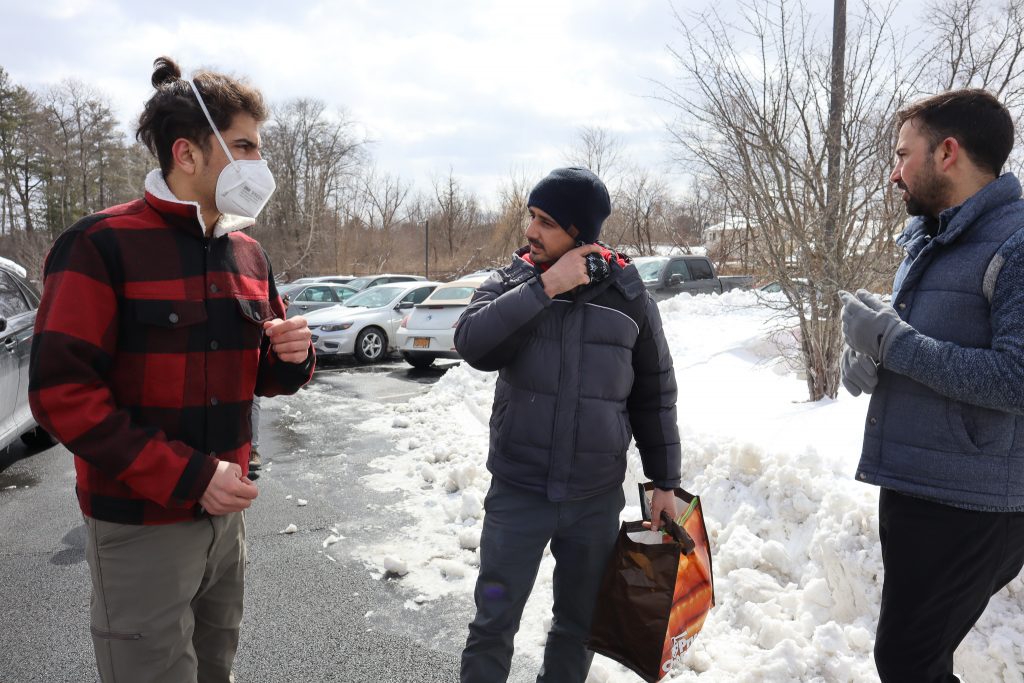
Sadiqi, 31, is in Albany with his wife and two daughters, living in an apartment that USCRI found, but he doesn’t currently have a car or license to drive, so his family has been relying on the local bus system. “It’s very hard for me,” he said. “It’s cold here right now. You have to wait for a long time,” Sadiqi said about the bus.
And for his kids, he said, the transition to a school in English has been particularly challenging — especially for his nine-year old daughter. “It was very hard for her. She wants to know everything, what the teacher is saying. But she was not able to,” he said. “And then she was coming home, [saying], ‘Father, I don’t understand them? What should I do?’”
The children in the Khwajazada family echoed the frustrations that Sadiqi’s daughter brought up. Most of the time, they said, they were not provided translators at school.
“I just watch [class],” Saber, 14, the youngest boy in the family, said through an interpreter. His 16-year-old sister, Sara, chimed in. “I also don’t have a translator. So I don’t know what to do,” she said. “So when it’s test time, I can’t answer the questions so I don’t get the marks. So I feel sad, like, ‘why didn’t I learn things so that I could answer them now?’”
Some Afghan evacuees also expressed concern about whether the aid offered might be temporary.
Suneeta Khan Muhammad, a 37-year-old Afghan mother who has been living in Albany for several years, was at the donation drive on Sunday to pick up food. Her children were stuck in Afghanistan when the Taliban began to take over, but she was reunited with them in August, when they arrived in Albany.
Although the details of her battle for reunification with her children were shared widely in local and national media, and by USCRI, she says she still does not have enough resources to adequately provide for her four children. After the attention around her case subsided, she said, so did the aid – and now, she is seven months pregnant with twins on the way, and owes more than $1,000 in electric bills.
“Sometimes, we don’t have enough things, or we are late on the rent,” she said through an interpreter. “I was not really happy, and don’t really have the life that other people have. We didn’t hang out, or go to places with the kids. We just stay in and eat like rice or beans — to just live.”
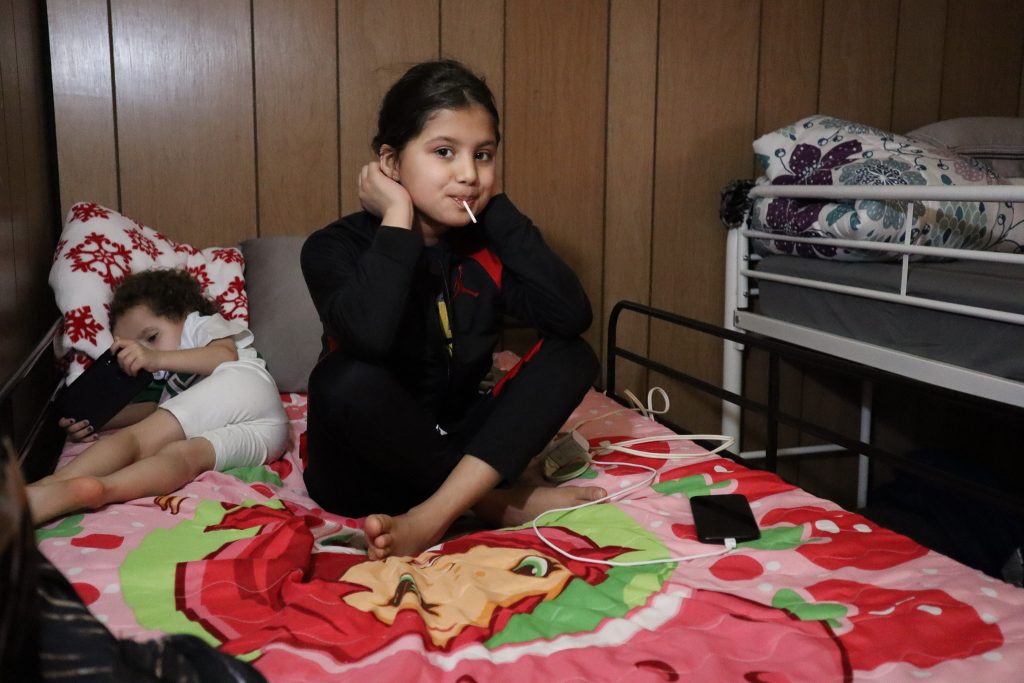
Fariba, the mother in the family of nine, also expressed concern about how the family’s long term future may unfold, and what their legal pathways forward look like to stay permanently in the United States.
That’s why Sara Lowry, a staff attorney at USCRI, has been organizing legal clinics for the Afghan evacuees, most of whom are in the United States on a legal status called humanitarian parole, which only lasts two years, Lowry said. So it is urgent that evacuees have legal consultations as soon as possible, Lowry said.
“We need to get going on this, because people are running out of time,” she said. “When you ask resettlement agencies to resettle evacuees that have this temporary, really unstable immigration status of parole, people don’t really get it that an unstable immigration status can really affect the mental stability of the families.”
Last week, the Biden administration announced that Afghan evacuees in the United States under temporary parole status will be eligible to apply for Temporary Protected Status, which would allow them to stay in the country for 18 months.
And despite the difficulties, the Khwajazada family is embracing their new country. The oldest son, Mohammad Aimal Khwajazada, wore a shirt with an American flag emblazoned on the sleeve.
TestPost3
“Now, this is my new flag,” the 22-year-old said, pointing at the stars and stripes and laughing. The children expressed hopes of becoming computer scientists and engineers, and their parents said they welcomed the refuge that the United States has brought them.
“We want to have a peaceful, nice life, where we can just live and work and start living a normal life,” said Mohammad, the father.
Fariba, the mother, added: “We are thankful.”
“We were very scared over there,” she said. “Now, we feel safe over here.”
